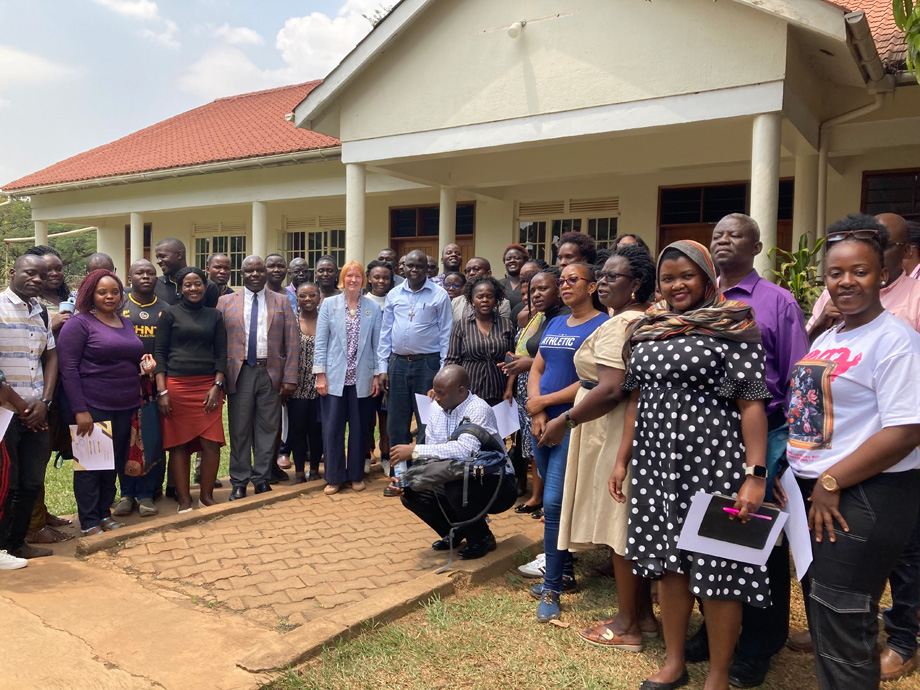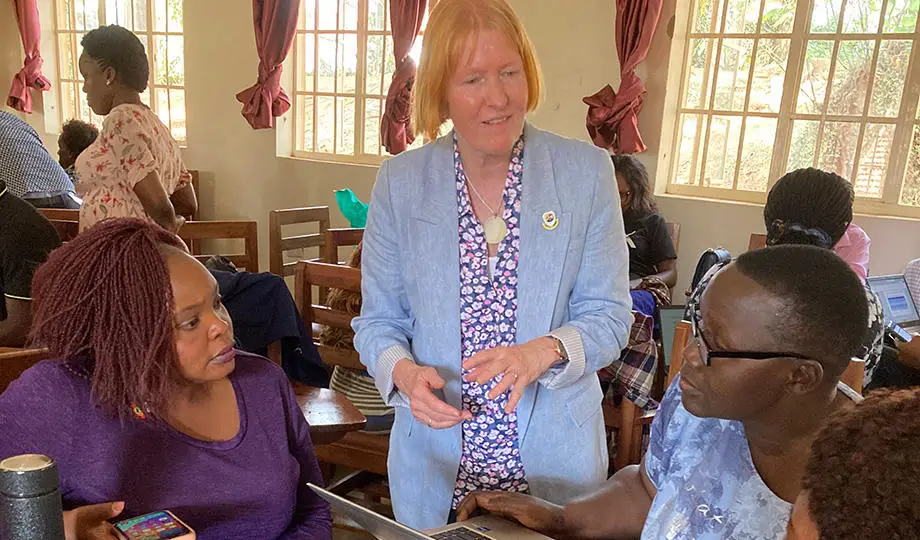- Details
- East Africa
- 582
A later-life learner from Brunel University of London has just returned from teaching a public health course in Uganda as part of her mission to help others in her retirement.
Buckinghamshire-based Dr Chris Barrett, 67, spent a week in a voluntary capacity at Uganda Martyrs University, introducing master’s students to Intervention Mapping – an approach for developing effective behaviour change – in order to tackle some of the country’s trickiest health concerns.
Chris had learned about Intervention Mapping during her own Master’s in Public Health and Health Promotion at Brunel, from which she graduated in 2020. But what had led this experienced medical scientist, who had gained a doctorate in immunology in the 1980s, to that course, and to her teaching in Africa?
“I had been working for GSK, the multinational pharmaceutical company, for over 25 years when the opportunity arose for me to do a voluntary secondment with Save the Children as an immunisation advisor,” Chris explained. She supported a project in Nigeria over a 6-month period in 2016, and then “being involved in something like that, you don’t come back the same. It changes your view on the world. I developed a passion for healthcare in developing countries.”

Chris retired a year later and went with a mission agency to the Gambia, working in a rural health clinic, where she developed a pharmacy stores tracking system. The experience gave her further insights into healthcare issues in African countries, and the need for health promotion campaigns. So in 2019 she enrolled on the master’s course at Brunel, just across the Buckinghamshire border in Uxbridge.
“My time in the Gambia meant that I had a ready-made idea for my health promotion assignment,” she said. It impressed the lecturer, Dr Kei Long Cheung, and the following year he started using her example in lectures.
“Many of the students on the course are international students,” Chris added. “So the fact I had brought in something from low- and middle-income countries, it resonates with them.” The success of her example led to Kei inviting Chris to help on the course, and then, more recently, to Chris becoming an honorary lecturer at Brunel.
Her new public health knowledge, the usefulness of the Intervention Mapping approach, the needs of African countries, an appetite for teaching… All these fused together in an idea to deliver a short Intervention Mapping course – borrowing learning materials, with permission, from Kei and from the publisher of an important book on the topic, but adapting them to meet the needs of the shortened course in low- and middle-income countries.
“Intervention mapping had already been used successfully in, say, HIV interventions and unplanned teenage pregnancies in South Africa,” Chris explained. “I bring a little bit more of the environmental aspects which affect people’s behaviour. For example, if there’s insufficient access to healthcare, or there’s aspects of the community such as social norms or public stigma, this can make people less inclined to practice health-seeking behaviour and attend clinics. That’s a health behaviour which can influence getting treatment or diagnosis for HIV and a whole range of diseases way beyond HIV.
“And environmental aspects can include interpersonal ones, such as whether families are able to talk with their adolescents about safe sex. Intervention Mapping is relevant to everything from malaria to metabolic and respiratory diseases, infant health and even healthcare services improvement.”
Chris trialled her short course in Ghana last year, and then asked previous Brunel students for further ideas of where to deliver it. Soon she had been invited by Uganda Martyrs University, and at the end of January arrived on their campus in the capital Kampala. Importantly for Chris, this was part of her voluntary work, so she paid all her costs.
“I taught 80 students on the university’s two-year public health master’s courses,” she said. “It’s a part-time course because a lot of the students have jobs as doctors, nurses, and so on. As locals, they have good knowledge of the health concerns that public health campaigns might need to tackle, from tropical diseases such as malaria and trachoma to issues such as alcohol abuse.” So explaining Intervention Mapping to these students, and discussing the environmental aspects in Ugandan families and societies, meant that the students started along the path to novel public health campaigns that might just make the difference.

Dr Kizito Omona, the Dean of the Faculty of Health Sciences at Uganda Martyrs University, was grateful for what Chris delivered. “This course was indeed timely, and gave us the opportunity to improve the delivery of health promotion campaigns to our learners, who are our treasured ambassadors throughout Uganda and beyond,” he said. “We have got the concepts right, and what remains is the practicality of it, which we shall continue to strive for.”
Now Chris is back in the UK, she’s providing feedback on the course assignments the Martyrs students produced. And with positive feedback from the students on what she’s taught them, Chris knows she has a tried-and-tested course that she can deliver in other low- and middle-income countries as part of her volunteering activities.
“I do have limited time because of a variety of commitments: my honorary lecturing at Brunel, of course, but also UK refugee support, such as tutoring of Ukrainians, and all sorts of other things,” Chris explained. But, with the strength of her faith guiding her, she tends to be led by what she believes she’s meant to be doing. “I can’t make any promises, but if I still believe that I’m meant to go to some other countries, in Africa or elsewhere, and the opportunity arises… It might just be right!” By Joe Buchanunn, Brunei University of London






